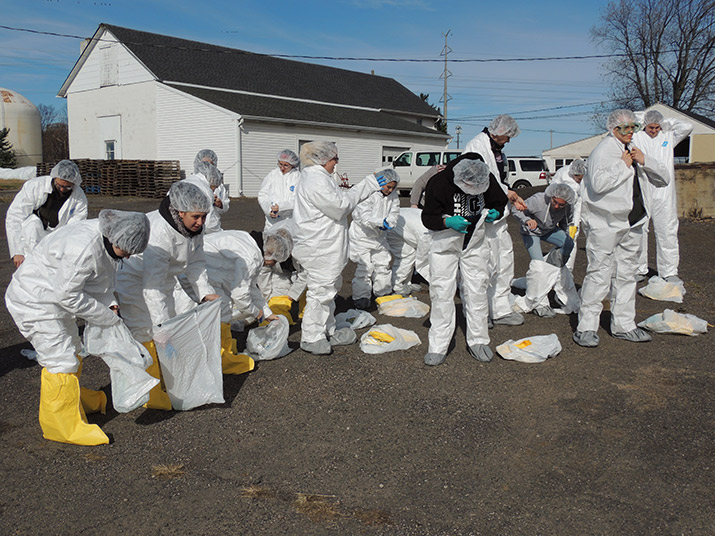Delaware Valley University Students Participate in USDA Mock Disease Outbreak
Delaware Valley University hosted a mock disease outbreak on campus with the USDA on Saturday, Nov. 9. Students from a variety of majors took part in the event, which allowed them to see how their majors and future careers might play a role in responding to an outbreak.
In the mock scenario, students were given information on a human patient who had been sickened by a virus that was previously only seen in chickens in a foreign country. The students sprung into action to help identify the source of the outbreak and, come up with a plan for containing the spread.
Students conducted mock interviews to gather information. They put on personal protection equipment to practice examining and taking samples from animals on the farms to see if they were infected. Business administration majors calculated costs associated with responding to the outbreak. They also provided cost estimates for a range of decisions administrators would need to make in the case of an outbreak. Secondary education majors took on the role of public information officers and developed responses to media questions as well as messaging to help keep people and animals safe.
“Any critical issue will always need a holistic and multi-disciplinary approach,” said Dr. Jennifer Shelly, a DelVal assistant professor of animal science. “Having the chance to be a part of a mock disease outbreak with the USDA was a great way for our students to learn how their majors and future careers might play a role in solving a real-world problem like an outbreak. At Delaware Valley University, experiential learning is at the core of what we do. We go beyond the classroom and give students a chance to apply what they’re learning.”
Dr. Linda A. Detwiler ’80, a DelVal dairy science alumna and trustee, visited campus to help lead the exercise. Dr. Detwiler is a public practice veterinarian who has built an international reputation in her field. During her career with the USDA, Dr. Detwiler helped coordinate a national plan for controlling scrapie (a fatal prion disease of sheep and goats). Dr. Detwiler went on to become a senior staff veterinarian for the USDA’s Animal and Plant Health Inspection Services. She headed the national task force on Bovine Spongiform Encephalopathy (mad cow disease), playing a key role in developing American policy to prevent and control the disease. In addition to Dr. Detwiler, the USDA team included a veterinary medical officer, an epidemiologist, and Beth Wittenbrader '81, a DelVal alumna who is an animal health technician.

Credit: Delaware Valley University. Delaware Valley University students put on personal protection equipment during the mock disease outbreak.
The experience provided students with lessons that will be useful in their futures.
Jessica Topka ’20, an animal science major, found the experience “empowering.”
“The mock disease outbreak was a great opportunity to experience how our interests can be applied to address very real health crises,” said Topka. “It is empowering to know that our expertise can be applied to protecting people and livestock on such a large scale.”
Autumn Heidenthal ’20, a zoo science major, said she gained a better understanding of the process for responding to an outbreak.
“You know it is going to take a lot of precautions, but the mock scenario helped me realize the depth of the process,” said Heidenthal.
Kanykei Kalykova ’19, ’20 (MBA), a business administration 4 +1 student, worked on calculating costs.
“I enjoyed participating and learned a lot,” said Kalykova. “We calculated the approximate cost of the supplies they would need and other costs. We concentrated first on the larger costs. Some of the costs we looked at included renting hotels and vehicles, locating a car wash and procuring equipment.”
Joshua Bethard ’21, an agriculture education major, served as a public information officer during the mock outbreak.
“It was a good opportunity to practice how we would simplify what we were seeing and communicate the science to the public to keep people and animals safe,” said Bethard.
The mock outbreak was the final event of One Health Week on campus. One Health is a multi-disciplinary approach that works locally, regionally, nationally, and globally to attain optimal well being for people and society, the environment and plants, and animals. Together, the three major components make up the One Health triad, and the well being of each is inextricably linked to the others in the triad.
To learn more about DelVal’s One Health programs, please visit delval.edu/onehealth.